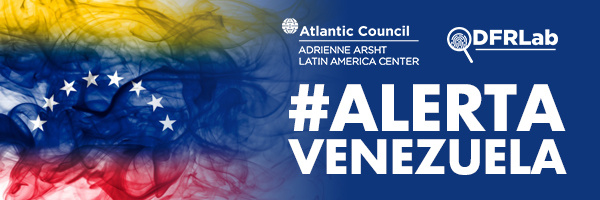#AlertaVenezuela is leading the way in identifying, exposing, and explaining disinformation within the context of one of the Western Hemisphere’s largest crises in recent history, where the fight for control of the information space will continue to pose a challenge for the region.
As this will be the final #AlertaVenezuela newsletter of 2019, the DFRLab is looking back at the year.
TOP STORY: Maduro and Guaidó’s social media year in review
As Nicolás Maduro and Juan Guaidó waged a political battle for Venezuela, they spent 2019 going head to head on social media as well. Social media is an important battlefield in Venezuela and one of the areas the regime prioritizes in order to control the country. The DFRLab analyzed their social presence on Facebook and Twitter from January to December 2019 and concluded that, even though Maduro has more followers and page likes, Guaidó garners more engagement with his posts.
On Facebook, Guaidó saw a major increase in page likes following his proclamation as interim president of Venezuela in January. The number of likes for his official page continued to rise significantly until May, when it stabilized. On April 30, Guaidó called for an uprising against Nicolás Maduro, which attracted international attention and likely further contributed to the growth of his page. The Venezuelan military forces, however, stayed loyal to the regime. After that, the number of likes for his page continued to grow, but with less intensity. Guaidó started the year with about 5,000 likes for his official page and finished with around 230,000 likes – a growth of 4,300 percent.
Maduro also saw a significant increase in the number of likes for his page in the first months of the year, especially in January and February, and a less intense growth after that. In all, the number of likes for Maduro’s page increased 35 percent, reaching 896,400 likes in December.
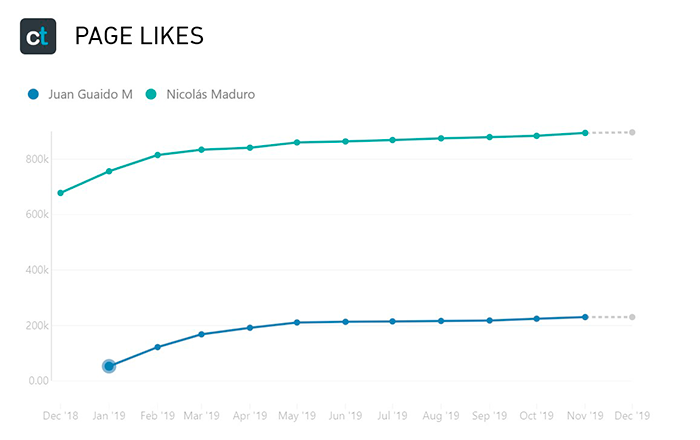
Even though Maduro’s page had more followers, the number of interactions – likes, comments, shares, and other reactions – with Guaidó’s posts was higher, indicating that the public engaged more with Guaidó’s posts than Maduro’s. In the beginning of the year, Guaidó had a spike on his interaction rate, likely given his relatively sudden high profile on the international stage. After that, even though the average rate of interaction with his posts fell, it still outperformed Maduro.
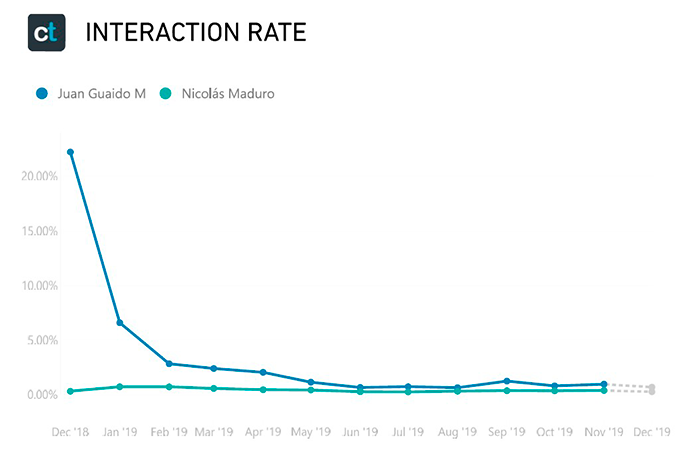
Something similar happened on Twitter, where Guaidó also saw a surge in the number of followers. On January 14, 2019, he had 343,000 followers, and, by January 31, he had garnered 200 percent more followers, reaching a total of 1 million. By December 16, toward the end of the year, he had 2.3 million followers. Maduro started 2019 with 3.43 million followers and finished with 3.7 million. Of that number, there is some indication that some of Maduro’s followers could be inauthentic. Therefore, Guaidó’s follower growth was relatively robust in 2019 overall, in comparison to Maduro’s more modest – and possibly inauthentic – growth.
On Twitter, Guaidó also had a higher interaction rate than Maduro. The volume of likes and retweets that Guaidó garnered for each post, on average, spiked in the beginning of the year, after which it fell from February through June before remaining relatively stable in the second half of the year. The average engagement that he received remained higher than Maduro’s average throughout the year.
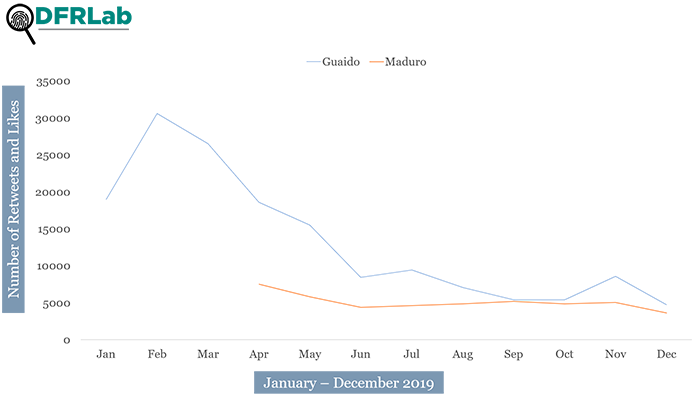
TALK OF THE COUNTRY: Most-engaged articles for the year
- “U.S. liberals embrace socialist policies destroying my home, Venezuela,” published by USA Today on February 15. The article was shared 382,307 times on Facebook and garnered 1,453,704 interactions, including shares, comments, and reactions, across all public and private posts on Facebook. In total, posts referencing the article received 3.5 million engagements on Facebook and Twitter combined. The piece describes Venezuela after Chavez took office in 1999. The author emphasized the destructive consequences of socialism in the country, pointing to cases such as inflation and children suffering from malnutrition.
- “Venezuela’s Collapse Is the Worst Outside of War in Decades, Economists Say,” published by The New York Times on May 17. The article was shared 161,356 times on Facebook and garnered 840,393 interactions, including shares, comments, and reactions, across all public and private posts on Facebook. In total, posts referencing the article received 1 million engagements on Facebook and Twitter combined. The piece explored the economic collapse in Venezuela due to poor governance, corruption, and misguided policies of the Maduro regime and his predecessor, Hugo Chávez.
Both articles were published after Venezuela’s National Assembly leader Juan Guaidó was recognized as many countries as the country’s legitimate leader.
The article published by a Venezuelan outlet that received the most engagement on social media in 2019 was:
- “FAO: 6,8 millones de personas en estado de desnutrición en Venezuela” (“FAO: 6.8 million people suffer from hunger in Venezuela”), published by La Patilla on November 12. The article garnered 35,603 interactions, including reactions, shares, and comments. In total, the piece was shared 11,519 times on Facebook and received 15,000 engagements on Facebook and Twitter combined. The piece described the UN’s Food and Agriculture Organization’s (FAO) report published in July entitled “The State of Food Security and Nutrition in the World 2019.” FAO’s report explained that Venezuela shows a significant increase in the prevalence of undernourishment in recent years.
On Facebook, the most engaged-with post in 2019 was published by the page Pastor Hugo Albornoz Oficial, an Ecuadorian missioner. He wrote “Les presento a Abraham El Niño Venezolano de 10 años que conmovió mi corazón, estaba comiendo un pedazo de carne cruda y en mal estado, lo lleve a comer y le pregunté si necesitaba algo más y me pidió zapatos ya que tenía sus pies muy lastimados.” (“I present to you Abraham, a Venezuelan kid who is 10 years old and who touched my heart; he was eating a piece of raw meat and in a bad state. I took him to eat and asked him if he needed something more, and he asked for a pair of shoes because his feet hurt a lot.”) (archive). The post, published on April 4, garnered 255,830 shares and 972,485 reactions, reaching 44,870 comments. The post included a video between him and the kid, while Hugo Albornoz – the namesake of the Facebook account – was cleaning the kid’s feet, a Catholic tradition mirroring Jesus’s washing of his disciples’ feet.
KEY TERMS ON TWITTER
Nicolás Maduro and Juan Guaidó
The DFRLab examined the mentions on Twitter of both “Nicolás Maduro” and “Juan Guaidó” between November 1 and December 11. In total, Maduro garnered 530,506 mentions, while Guaidó reached 319,357 mentions. The marches on November 16, when supporters of both Juan Guaidó and Nicolás Maduro took to the streets in Caracas in parallel, increased the number of mentions on Twitter for both terms.
The post (archive) that garnered the most retweets mentioning “Nicolás Maduro” came from the account @cristiancrespoj (archive), reaching almost 9,000 retweets and 11,300 likes. On the other hand, @Almagro_USA2015 (archive), an account that parodies @Almagro_OEA2015, the Secretary General of the Organization of American States, published (archive) the most retweeted post mentioning “Juan Guaidó,” which garnered 11,100 retweets and 23,400 likes.
Juan Guaidó
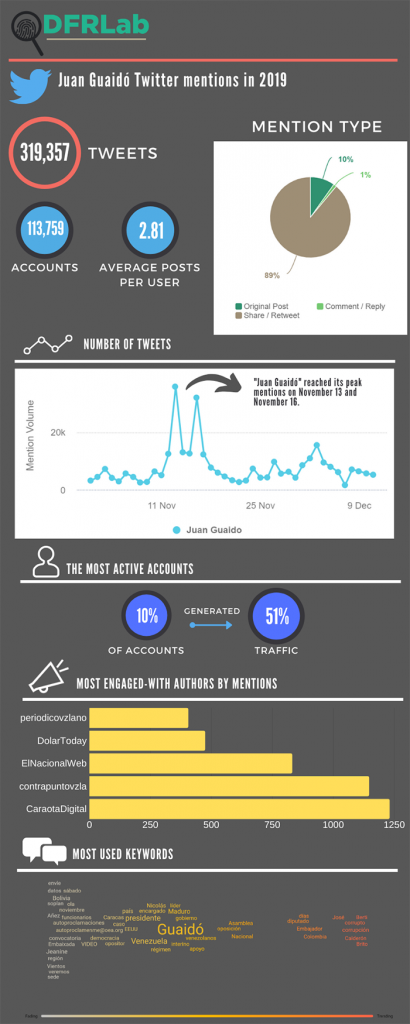
Nicolás Maduro
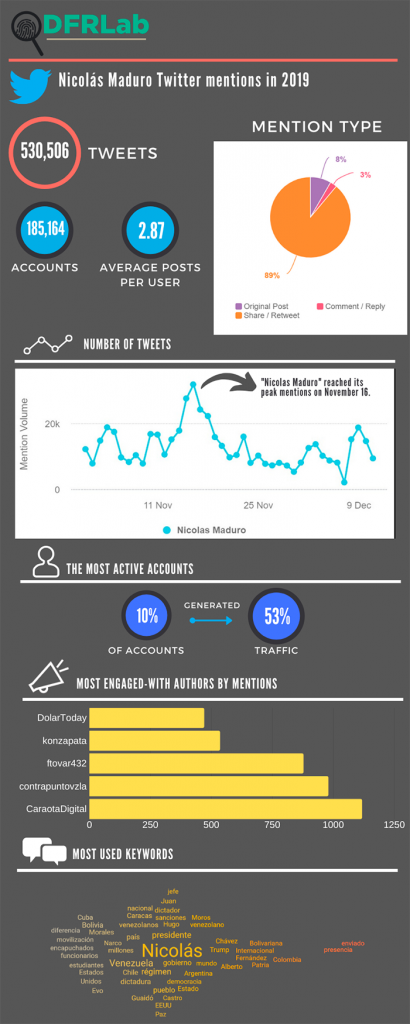
OFFICIAL STATEMENTS: Key phrases of the year
Juan Guaido, President of the Venezuelan National Assembly, upon proclaimation to be Interim President of Venezuela.
“Hoy #23Ene tendremos la oportunidad de reencontrarnos como pueblo en toda #Venezuela. Las miradas del mundo estarán hoy sobre nuestra patria. Les hablaremos de como lograremos: 1. El cese de la usurpación 2. Gobierno de transición 3. Elecciones libres #GritemosConBrio”
“Today, #Jan23, we have the opportunity to come together again as a people in all of #Venezuela. The eyes of the world are on our nation today. We will share how we are going to achieve it: 1) the end of the usurpation; 2. a transition government; 3. Free elections #GritemosConBrio (Let’s shout with verve)” — Juan Guaidó, President of the Venezuelan National Assembly, on Twitter (archive) on January 23, 2019, after his proclaimation as the Interim President of Venezuela.
“The citizens of Venezuela have suffered for too long at the hands of the illegitimate Maduro regime. Today, I have officially recognized the President of the Venezuelan National Assembly, Juan Guaido, as the Interim President of Venezuela.” — Donald Trump, President of the United States of America, on Twitter (archive) on January 23, 2019. Trump recognized Guaidó as the Interim President of Venezuela.
“Dejen de llamar a la guerra, dejen de llamar a la intervención militar, dejen de apoyar un golpe de Estado que ya fracasó. Fracasó y no se dan cuenta. Aquí está gobernando la Revolución, y vamos a seguir gobernando.”
“Stop calling for war, stop calling for a military intervention, stop supporting a coup that already failed. It failed, and you have not noticed. Here [in Venezuela] the Revolution is ruling, and we are going to continue ruling.” — Nicolás Maduro said on February 2, 2019, just over a week after Guaidó was proclaimed interim president. By then, a number of nations, including the United States, Canada, and many in Latin America, had announced their support for Guaidó as the country’s legitimate leader.
Juan Guaido urged the Venezuela military to join his side in order to oust Maduro’s regime
“Pueblo de Venezuela inició el fin de la usurpación. En este momento me encuentro con las principales unidades militares de nuestra Fuerza Armada dando inicio a la fase final de la Operación Libertad. Pueblo de Venezuela vamos a la calle, Fuerza Armada Nacional a continuar el despliegue hasta que consolidemos el fin de la usurpación que ya es irreversible.”
“People of Venezuela, the end of usurpation has arrived. At this moment, I am with the main military units of our armed forces, starting the final phase of Operation Liberty. People of Venezuela, we will go to the street with the armed forces to continue taking the streets until we consolidate the end of usurpation, which is already irreversible.” — Juan Guaidó on Twitter (archive) on April 30, 2019, after he called for members of the armed forces to switch sides and demand the ouster of Nicolas Maduro
“Condenamos enérgicamente el intento de golpe de Estado en #Venezuela, por parte de la derecha que es sumisa a intereses extranjeros. Seguros que la valerosa Revolución Bolivariana a la cabeza del hermano @NicolasMaduro, se impondrá a este nuevo ataque del imperio.”
“We energetically condemn the coup attempt in #Venezuela by the right-wing which is submissive to foreign interests. We are sure that the courageous Bolivarian Revolution, leaded by brother @NicolasMaduro, will get ahead from this new imperialism’s attack.” — Evo Morales, then-president of Bolivia, on Twitter (archive) on April 30, 2019. He condemned Guaidó’s call for the Venezuelan military to topple the Maduro regime.
Bolivia: Coup vs Not a Coup
“No podemos hablar hoy en Venezuela de que en Bolivia hay un golpe de Estado, hubo demostración de un fraude. Ahí hay un pueblo exigiendo, exigencias similares a las de Venezuela, elecciones libres.”
“We can’t say today, in Venezuela, that there was a coup d’état in Bolivia. There was evidence of fraud. There is a people making similar demands to those made in Venezuela: free elections.” — Juan Guaidó, speaking to unions in Venezuela on November 11.
“No se equivoquen, no saquen cálculo falsos. Si se comen la luz actuaremos apegados a la Constitución, de manera firme y total para defender el derecho a la paz, la convivencia, la democracia y la felicidad del pueblo… no se equivoquen miren que este golpe de Estado nos eleva aún más la fortaleza combative.”
“Don’t make a mistake, don’t make false calculations. If you cross the line, we will act according to the Constitution, in a firm and complete way to support the right to peace, coexistence, democracy, and people’s happiness… don’t make a mistake, this coup d’état increases our combative strength even further.” — Nicolás Maduro, in a message to his opponents on November 10.
In November, Juan Guaido followed a series of protests in Venezuela against Maduro
“¡Vamos con los estudiantes, vamos con el presente y el futuro de Venezuela! Hoy los estudiantes salen a las calles y nuestro llamado es a acompañarlos. La mejor reivindicación que podemos tener como venezolanos es conquistar juntos la Libertad. #EstudiantesEnProtestaSostenida.”
“Let’s go with the students; let’s go with the present and the future of Venezuela! Today the students take to the streets and it is our call to join them. The major claim we can have as Venezuelans is to conquer freedom together.” — Juan Guaidó on Twitter (archive) on November 21, after students organized a march in Venezuela, using the hashtag #EstudiantesEnProtestaSostenida (“Students in sustained protest”).
WHAT WE ARE READING
Venezuela: Another Unhappy New Year! was published by Forbes on December 11, 2019. The article explains what an economic contraction in Venezuela in 2020 might look like. It quotes an Economist Intelligence Unit report that said, “the Maduro government is ‘showing no signs of fracture.’” While the United States has tried to lobby Venezuela’s military to join Guaidó, it is unclear if protests against the Maduro regime will continue in 2020.
Subscribe to the #AlertaVenezuela newsletter
To receive future editions of the #AlertaVenezuela newsletter each week, sign up below!
